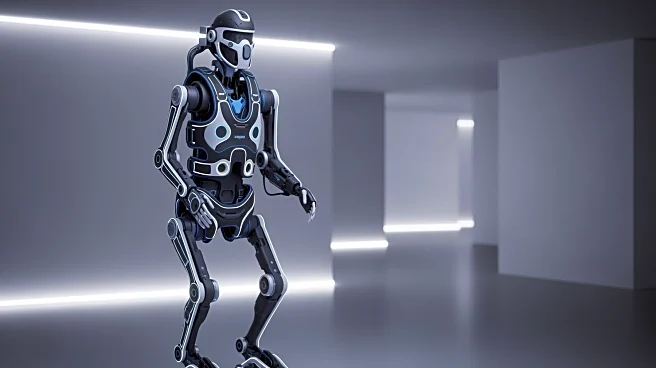What's Happening?
Wandercraft, a French robotics company specializing in self-balancing exoskeletons, has received its second clearance from the U.S. Food and Drug Administration (FDA) for its Atalante X exoskeleton. This
clearance allows for expanded indications and upgraded features, enhancing its use in neurorehabilitation. The Atalante X is now authorized for individuals with spinal cord injuries from levels C4 to L5 and those with multiple sclerosis, broadening access to hands-free gait therapy. The device, powered by artificial intelligence, has been refined through extensive simulations and real-world applications. It is currently used in over 100 rehabilitation and research centers worldwide, supporting thousands of patients in regaining mobility.
Why It's Important?
The FDA's clearance of the Atalante X exoskeleton marks a significant advancement in rehabilitation technology, offering new hope for individuals with severe mobility impairments. This development is particularly impactful for those with spinal cord injuries and multiple sclerosis, conditions that affect millions globally. By enabling upright movement and walking independence, the Atalante X can improve cardiovascular health, bone density, and psychological well-being. The device's ability to provide personalized training at the joint level enhances its therapeutic potential, making it a valuable tool for clinicians. This advancement could lead to improved quality of life for patients and reduced healthcare costs associated with long-term disability management.
What's Next?
Following the FDA clearance, Wandercraft plans to continue expanding the deployment of the Atalante X exoskeleton in rehabilitation centers across the U.S. and globally. The company is likely to focus on further clinical trials to explore additional applications and benefits of the device. As the technology gains traction, it may attract interest from healthcare providers and investors looking to support innovative rehabilitation solutions. The success of the Atalante X could also inspire further research and development in the field of robotic-assisted rehabilitation, potentially leading to new breakthroughs in patient care.
Beyond the Headlines
The clearance of the Atalante X exoskeleton highlights the growing role of robotics and artificial intelligence in healthcare. This development raises important ethical and regulatory considerations regarding the integration of advanced technologies in medical treatment. As these devices become more prevalent, ensuring patient safety and data privacy will be crucial. Additionally, the widespread adoption of such technologies may necessitate changes in healthcare training and infrastructure to accommodate new treatment modalities. The success of the Atalante X could pave the way for broader acceptance and integration of robotic solutions in various aspects of healthcare.









